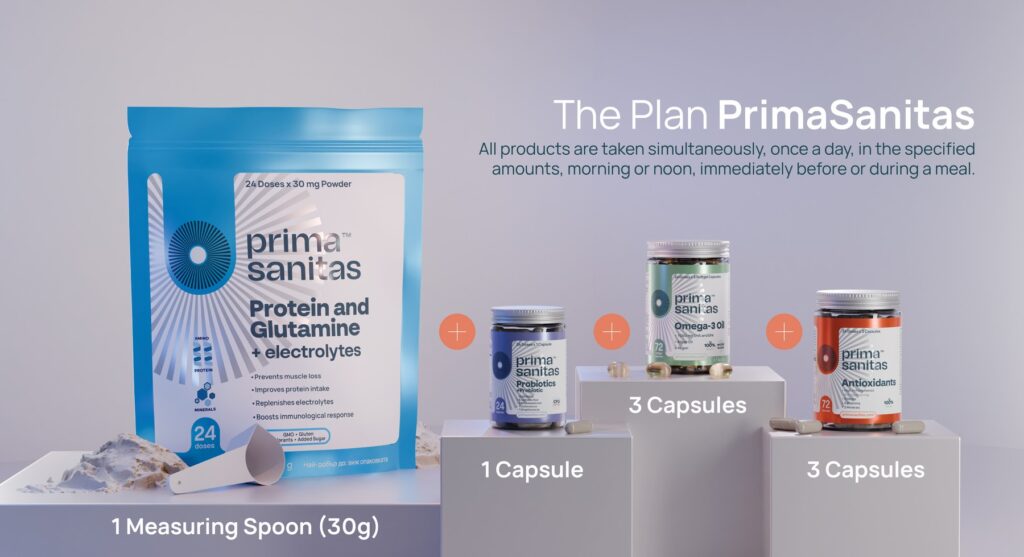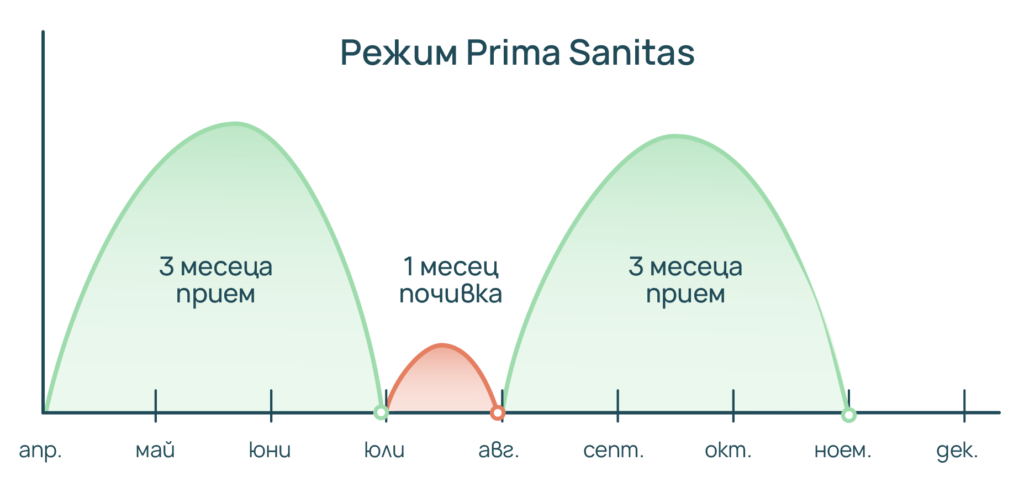Inspired by the healthy effects of the Mediterranean diet Prima Sanitas dietary supplements are aimed to provide, in appropriate daily amounts, high-quality and proven healthy nutrients and bacteria that contribute to optimizing human healthy dietary diversity.
Prima Sanitas dietary supplements are originally designed to be used as a regimen by individuals with chronic conditions suffering from malnutrition, high levels of oxidative stress, inflammation, fatigue, gastrointestinal problems, immune system decline, dysbiosis, malnutrition and other adverse events arising as a result of their disease or the medical treatment administered.
Benefits of the use of appropriate dietary supplements are reported not only in people with chronic diseases. Administration of Prima Sanitas Regimen to healthy individuals along with dietary adjustment and exercise may assist in reaching a healthy nutritional balance, correction of nutritional deficiencies, enhanced recovery after exercise, mental resilience and a well-functioning gut microbiome. Improved body health is associated with quality of life improvement and incidence reduction of multiple chronic noncommunicable diseases.
Prima Sanitas products are also suitable for:
Important
Consult your primary doctor before using Prima Sanitas dietary supplements in case you are taking prescribed drugs on a regular basis in order to evaluate drug interactions.


При хора без хронични заболявания се препоръчва на всеки 3 месечен прием на Режим Prima Sanitas да се провежда 1 месец почивка с цел избягване на прекомерно натрупване на веществата в организма.

Prima Sanitas Antioxidants contains highly concentrated plant extracts, vitamins and micronutrients that assist in reaching a high daily intake of dietary polyphenolic molecules and saponins.
The substances in the complex have a strong antioxidant effect and lead to reduction of oxidative stress and free radicals, improvement of gastrointestinal mucosa function, improvement of digestion and absorption processes, reduction of fatigue, prebiotic stimulation of gut microbiome, normal immune and nervous system function. Prima Sanitas Antioxidants works synergistically with the other Prima Sanitas Regimen products.

Prima Sanitas Omega-3 Oil contains a high 70% concentration of marine-derived essential Omega-3 fatty acids. It provides a high daily dose of 1,050 mg of EPA and DHA, which contributes to reaching a healthy ratio among Omega-3 and the other fatty acids in the body. An improved fat ratio is associated with normalization of inflammatory response, good vision, normal brain function, lipid profile improvement and beneficial effects on the cardiovascular system.
An all-natural product derived from pure algae grown in a controlled environment that contains no additional impurities from toxins and contaminants, therefore, its continued intake is considered safer compared to oils derived from ocean fish. Prima Sanitas Omega-3 Oil works synergistically with the other Prima Sanitas Regimen products.
IMPORTANT:
Take Prima Sanitas Omega-3 Oil immediately before or during meals. In some more sensitive people intake of high doses exceeding 1 g/d of Omega-3 EPA and DHA fatty acids in the fasting state may cause a slight laxative effect. In this case temporarily reduce intake to 2 or 1 capsule a day according to individual sensitivity.

Prima Sanitas Probiotic + Prebiotic contains 200 billion helpful bacteria, a combination of 15 different strains of the Lactobacillus, Bifidobacterium, Lactoccocus and Streptococcus families with a prebiotic. Prima Sanitas multistrain probiotic with a high microbial count contributes to lactose absorption and reaching a healthy and diverse gut microbiome, which is associated with normal immune system function, normal digestion and absorption processes, normal gastrointestinal mucosa function, reduction of gastrointestinal inflammatory reactions, reduction of pathogenic bacteria proliferation. Prima Sanitas Probiotic + Prebiotic works synergistically with the other Prima Sanitas Regimen products.

Prima Sanitas Protein and Glutamine + electrolytes is a balanced combination of isolated whey protein, the most common amino acid L-Glutamine and the essential electrolytes potassium, sodium and magnesium.
Suitable for athletes with increased physical activity. The combination contributes to the maintenance of normal gastrointestinal mucosa function, normal immune system function, restoration and maintenance of normal muscle function, preservation of lean muscle mass and effective activation of anabolic processes in skeletal muscles. Prima Sanitas Protein and Glutamine + electrolytes works synergistically with the other Prima Sanitas Regimen products.